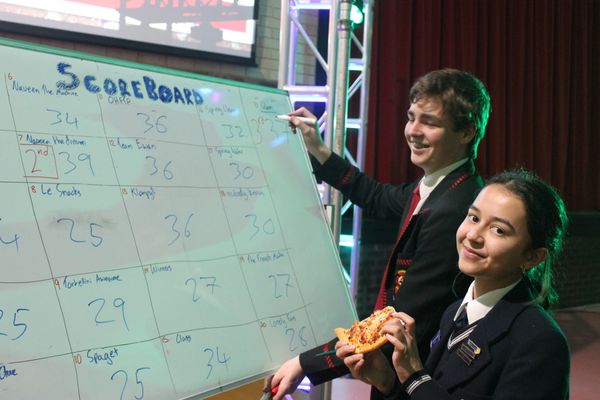Recently I was privileged to attend the choral presentation, in collaboration with Wesley and Penrhos, at St Patrick’s Basilica. Students were under the tutelage of their respective instructors and a visiting artist in residence, Michelle Leonard OAM. It was a glorious event that caused me to reflect upon the level of joy that simply singing a song can bring to one’s life. Every student was happy and joyful, as was the audience. This love of learning is something that sometimes does not transfer into all subjects. Is it because there is fundamental joy and, as a result, inherent growth embedded in performance?
Singing has not been the only pursuit offered to our Junior School students this past second half of the term. Many of our students have joined in the Lion King Junior - either as performers, dancers, singers or all three. The palpable energy that has rung out of the music room every Wednesday afternoon practice, and subsequent lunch and recess times, as well as various Sundays, has again been joyful. No students have needed reminders to turn up on time, they rush in ready to go, eager to learn, practice, and improve.
Our Early Years Students have similarly embraced further pursuits in performance through the Edu Dance program that has been offered weekly as part of the Physical Education program. Little boys who have been shy or less than willing to be in front of an audience are spurred on by the teamwork, vibrancy, and energy of dance. They began not knowing a single action and, slowly but surely, have worked to improve, practice, and learn; again, without too much encouragement but with the intrinsic desire to improve and get it right.
It has made me wonder how we can harness this growth mindset in more academic pursuits. I fear that the pressure of attaining a certain mark or number, being constantly judged against the cohort, and having a fixed mindset of I’m not good at maths, for example, can lead to young primary school-aged students switching off far too early to what learning is all about. Are they losing the joy and the disposition? Is creativity being crushed in an attempt to deliver marks and numbers in a report or app that provides parents with a measure of success, or dare I even say it, failure? No primary school student should feel like a failure. It is our responsibility to make learning purposeful, practical, creative, and collaborative, even with the constraints of an education system that wants us to deliver numbers and grades.
We have seen true excellence in our students who delivered speeches in the recent Speak Up Challenge. Love of learning was embedded in each delivery. We took students who were selected to perform at IPSHA and the South Perth Civic Centre Awards and suggested ways to improve and grow. Individually each student pocketed the feedback and tweaked his speech to add a little more polish to an already outstanding example of oracy and articulation.
We do not shy away from excellence; we want it to exist in every part of our learning journey. Excellence is not always measured by an A or a 100% grade. Excellence is personal and measured against yourself. We can challenge our students to be excellent in all that they do, by providing measured and explicit feedback. Comments like good work don’t drive a student to improve. Explicit comments like I really like the way you explained the character using the rule of three, do. The student knows what he did right and will do that same thing next time. As educators and parents, we can be more explicit with our praise so that we shape personal excellence and improvement.
When your son receives his report at the end of this semester, notice that we have our Social and Emotional Character development on the front page. This is deliberate. We want this to be the section of the report that you spend the most time discussing. Build your son’s character through the expectation and values we share as a school community. Encourage him to continue to strive for his best through these values. No doubt you will look through the report and consider the marks he has achieved. Some boys may be underachieving, some may need more time to develop understanding and concepts, some may rush their work and have little care for the finished product. Know that this can change if we instill perseverance underpinned by a growth mindset. Most of all know that joy for learning is what can change an attitude. The approach can change when the focus comes off the mark and onto the improvements and the purpose. We no longer need to learn about the capital cities of the world by heart, we can Google them. But we do need to have an inquiring mind that wants to know where they are, is interested in what they are called, asks why looks for reasons, and generally questions. These are the creative, critical, collaborative communicators who have character and want to learn because they love it and learning is fun. We are working towards celebrating and becoming these students in our Junior School.




